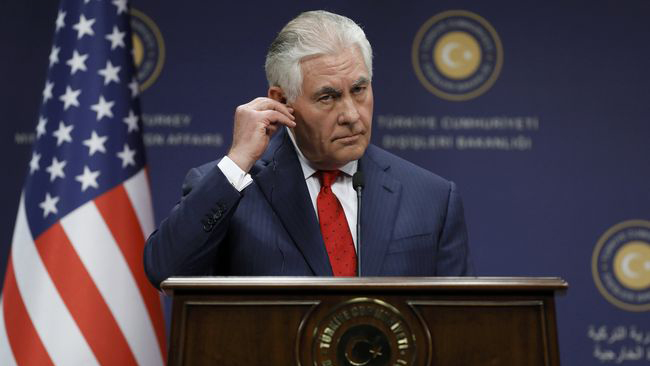On “red lines” for Russia
Expert: “Tillerson’s visit to Moscow will be a diplomatic trial of strength and attitudes as well as sort of a bargain in the distribution of roles”
US Secretary of State Rex Tillerson paid a visit to Moscow on April 12. As we were going to press, no results of this trip were known. Some circumstances make it a particular visit. For example, this is the first time a high-ranking official like this visits Russia after a Republican president came to power. Besides, this visit is being made after Western foreign ministers have discussed building up pressure on Russia to make it break “toxic” ties with al-Assad’s regime which used chemical weapons against his own people, which left more than 20 children dead. Following this, US President Donald Trump ordered missile strikes on the Syrian air force base from which airplanes with chemical bombs took off.
COMMENTARIES
Serhii SOLODKYI, First Deputy Director, Institute of World Politics:
“Russia entered Syria to begin, so to speak, a bargain with Western capitals – above all, with Washington and also with Paris and Berlin. Ukraine was also to be part of this package of negotiations. But the Kremlin’s plans were thwarted all at once. The US managed not to fall into Russia’s trap, and negotiations on Ukraine and Syria went on separate tracks. It was the first blow to Moscow’s self-confident tactics. The second blow was dealt past week, when the US gave a resolute response to the chemical attack in Syria. Russia expected the Syrian venture to assign it the role of a global actor and allow it to save the al-Assad regime (and thus stop the policy of changing the regime) and, what is more, to attain an unopposed influence on Ukraine. A stronger support for Ukraine by Western partners will be the harshest punishment for Russia. Moscow has made a Herculean effort to discredit Ukraine and make the West lose trust in Ukrainians. Russia banked on disputes inside the EU as well as between Europeans and Americans. Instead, the EU gave Ukraine a visa waiver. Trump paid his first foreign visit to Brussels. The more resolutely the US and the EU act together in support of the Syrian people and Ukraine, the fewer temptations Putin will have to act by way of special-purpose operations in international relations.
“If the US supports Ukraine still more strongly, this will be the main punishment for Putin. There should be more support in the political, military, and economic fields. Putin is behaving brazenly because he can see hesitations in the West.”
Oleksandr TSVIETKOV, professor, Americanologist, Diplomatic Academy, Ministry of Foreign Affairs of Ukraine:
“Tillerson’s visit to Moscow will be a diplomatic trial of strength and attitudes as well as sort of a bargain in the distribution of roles, not of spheres of influence. The negotiations will touch upon Russia’s attitude to al-Assad. I hope the Crimea topic will also be broached. In all probability, each side will make a brief comment after the meeting and largely remain on its present positions.
“For Russia, which is striving for strategic global domination, nuclear weapons and a strong-arm option are bargaining chips. This is why it seized Crimea to extend its influence further to the Mediterranean. Russia still keeps a naval and an air force bases in Syria, which cannot function on their own – they need a political cover of the local government. For this reason, Moscow is clinging to the al-Assad government.
“Besides, Russia is trying to split the European Union and the trans-Atlantic alliance between Europe and the US, to draw them into other battles, including the hybrid war, and to march on, remaining a global power. Paradoxically, these abrupt actions of Russia have produced an opposite effect – consolidation of the West.
“One of the positive strategic aspects of this situation is America’s revision of its views about activity on the international arena and cooperation with the West. On the other hand, the West is taking concerted action because it is impossible now to use the weapons banned by humankind. Hence, there are chances that the West will build a common frontline of countering the Russian side’s bitter attacks.
“Logic says that, in all probability, Putin’s support for al-Assad will result in threats or more serious sanctions against Russia.
“This matter will feature in the West’s diplomatic game with Russia. But will it be possible to carry this out? I think this question will be put on the agenda depending on the Russian side’s reaction and inquiry into the use of chemical weapons. But Putin’s refusal to meet Tillerson shows that Russia will be standing its ground. In this case the West will face a dilemma: to shut its eyes to a sharp increase of dangers and to ward off further strain in its relations with Russia, or to set the conditions that will also become true ‘red lines’ for Russia.”
John HERBST, Director, Dinu Patriciu Eurasia Center, Atlantic Council, Washington, D.C.:
“Western leaders are united in the belief that Moscow’s savage bombing campaign and support for the Assad regime are dreadful policies. They will condemn Moscow for them, but it is unlikely that they will collectively sanction Russia or take other concrete steps. All hinges on the US. Washington made clear that it will strike again if Assad uses chemical weapons. Will Washington extend this to barrel bombs and indiscriminate bombing of civilians? Maybe, but at this point it is not certain. If the US decided that any use of air power against civilians was unacceptable, it could ensure that these war crimes ceased. That would make it much harder for Assad to recover more territory because it has been precisely such bombing – by Russia aircraft – that has enabled the gains of the past 16 months. There is no Trump Doctrine at this point except: Thou shalt not use chemical weapons against civilians.”
Newspaper output №:
№26, (2017)Section
Topic of the Day





